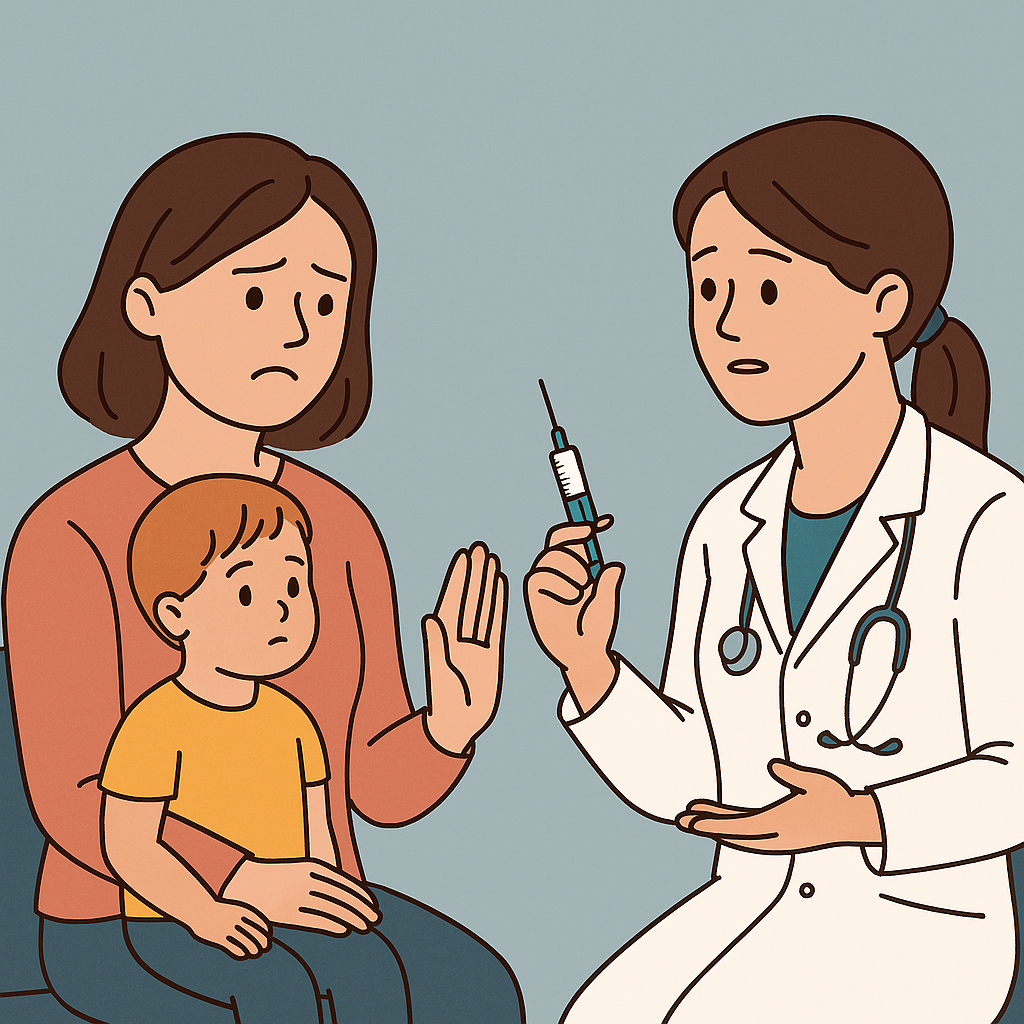

Dr Dean Eggitt
GP | Teacher | Politician | Speaker
- September 3, 2025
- 6:30 pm
- No Comments
Hot Topics: The Alarming Drop in Vaccine Uptake
Imagine walking into your first placement and finding your ward filling with children suffering from diseases you thought belonged in history books. This year’s vaccine uptake figures make that scenario less hypothetical than you might think – and for future doctors, understanding why it’s happening (and how to fix it) isn’t just an academic exercise, it’s a professional imperative.
For medical school applicants, topics like falling vaccine uptake aren’t just headline fodder — they’re an opportunity to demonstrate intellectual curiosity, public health awareness, and ethical reasoning under pressure. Interviewers want to see that you can analyse a complex, real‑world problem, weigh competing perspectives, and suggest practical, patient‑centred solutions. Being able to speak confidently about why this year’s figures matter — and how future doctors can help reverse the trend — will set you apart as someone who doesn’t just understand medicine’s science, but also its social responsibility.
"This year, several key childhood vaccines in the UK have fallen well below the WHO’s recommended coverage for herd immunity. As a future doctor, how would you explain the importance of vaccination to a hesitant parent, while also respecting their autonomy?"
New data from the UK Health Security Agency (UKHSA) shows that no major childhood vaccine in England met the World Health Organization’s 95% herd immunity target in 2024/25. Uptake for key immunisations – including MMR (measles, mumps, rubella), the four‑in‑one pre‑school booster, and Hib/MenC – has fallen to its lowest levels in over a decade.
This decline poses a serious public health risk, with experts warning of increased outbreaks of preventable diseases such as measles and whooping cough. For aspiring medics, this is a live example of how science, policy, ethics, and communication intersect in healthcare.
The Numbers at a Glance
| Vaccine & Schedule | 2024/25 Uptake (%) | Notable Context |
|---|---|---|
| MMR vaccine (both doses by age 5) | 83.7% | Lowest since 2009/10, well below WHO 95% target |
| Four‑in‑one pre‑school booster (polio, whooping cough, tetanus, diphtheria) | 81.4% | Lowest since records began in 2009/10 |
| Hib/MenC vaccine | 88.9% | Lowest since 2011/12 |
| Six‑in‑one vaccine (diphtheria, pertussis, tetanus, polio, Hib, hepatitis B) | 92.8% | Slight improvement, but still below WHO herd immunity target |
Why Uptake is Falling
The Royal College of Paediatrics and Child Health (RCPCH) points to a web of interlocking causes behind this year’s troubling decline in vaccine coverage. At the most practical level, many families are simply finding it harder to access vaccination services. The closure or consolidation of local clinics, coupled with fewer appointment slots and limited flexibility, has reduced opportunities for parents to get their children immunised. These access challenges are not evenly distributed – certain regions, particularly parts of London, consistently record some of the lowest uptake rates. The aftershocks of the COVID‑19 pandemic have also left a lingering impact, disrupting routine health services and weakening the habit of timely vaccinations.
Layered on top of these logistical barriers is a more insidious challenge: vaccine hesitancy. The digital age has amplified misinformation and outright disinformation, often packaged to look convincing on social media. For some communities, historical mistrust in institutions adds another barrier to acceptance, making official health messages harder to act upon. Parents who might otherwise vaccinate can become uncertain when confronted with alarming but misleading narratives about side effects, which spread far faster online than the slower, evidence‑based corrections issued by health bodies.
There are also systemic weaknesses within the health infrastructure itself. Gaps in NHS data systems mean that missed vaccinations can go unnoticed, making targeted follow‑up more difficult. Public health teams, already stretched by competing priorities, may lack the resources to run sustained outreach campaigns. In some areas, language barriers and cultural disconnects between service providers and the communities they serve leave important messages unheard or untrusted.
The consequences of these trends are not theoretical. When coverage drops below the threshold needed for herd immunity, the protective shield around the community starts to fracture. Measles – with its high level of contagiousness – becomes an early warning sign, often breaking out first and signalling wider vulnerability. Preventable diseases return to hospital wards, putting pressure on already stretched services. Each outbreak risks further eroding public trust, particularly if the public perceives it as a failure of the health system to protect them.
For aspiring medics, this decline in vaccine uptake isn’t just a matter of statistics; it’s a lesson in how multiple factors – social, structural, and scientific – converge to shape public health outcomes. Understanding these connections is central to the role of a doctor who must not only treat illness but also work to prevent it on a population scale.
Ethical & Professional Considerations for Aspiring Medics
The debate around declining vaccine uptake is more than a public health challenge – it’s a live test of the values and responsibilities that will guide you as a doctor. At its core, it engages all four pillars of medical ethics. Autonomy demands that we respect the right of parents to make decisions for their children, but that respect is not passive. It carries with it the professional duty to ensure those decisions are informed by clear, accurate, and balanced information. Beneficence reminds us that vaccination is not simply a personal choice; it is an act that safeguards both the individual child and the wider community by reducing the spread of serious, preventable diseases.
Alongside this sits non‑maleficence – the commitment to do no harm. While vaccines have rare side effects, failing to vaccinate carries a far greater and more certain risk of harm through disease outbreaks. Protecting patients means preventing the return of illnesses that modern medicine has worked so hard to control. Finally, the principle of justice challenges us to recognise and address the inequalities in vaccine access and outcomes. Whether those inequalities arise from geographical isolation, socio‑economic barriers, language differences, or cultural disconnection, they represent a moral imperative for action.
For aspiring medics, this is also an opportunity to see how these ethical pillars are embedded in the professional standards set out by the General Medical Council’s Good Medical Practice. Clear, compassionate communication is essential when discussing sensitive topics like vaccination. Safeguarding demands vigilance in protecting those most vulnerable to preventable diseases. And public health advocacy is part of the doctor’s wider role – speaking up for measures that protect populations, not just individual patients.
Understanding and applying these principles in the real world will prepare you for the moments in medicine where there is no easy answer, only the careful balancing of rights, responsibilities, and the greater good. This is the kind of insight and reasoning that medical school interviewers are looking for – and the kind of professional mindset that will serve you throughout your career.
How to Discuss This in a Medical School Interview
When an interviewer asks about falling vaccine uptake, the strongest responses begin with clarity and credibility. That means grounding your answer in the facts – citing the most recent data and the targets set by public health authorities. This instantly shows that you’re engaged with current, authoritative information rather than relying on vague generalities.
From there, move beyond a single‑cause explanation. Acknowledge that the reasons behind declining uptake are complex and interconnected, involving access barriers, misinformation, systemic gaps, and cultural factors. Oversimplifying the issue can make your answer sound naïve; showing that you understand nuance signals maturity and critical thinking.
A standout candidate also demonstrates balance. While you will rightly stress the urgency of maintaining high vaccination rates for public health, it’s equally important to convey empathy for parents who are hesitant. Recognising their concerns – and approaching them respectfully – reflects the communication skills medical schools prize.
Your answer should then pivot to solutions. Offer concrete, practical measures: bringing vaccines closer to communities through mobile units, running catch‑up programmes in schools, tailoring outreach to different cultural contexts, or improving NHS data systems so that missed doses can be quickly identified and followed up. Framing these ideas as constructive and achievable makes you sound like someone who thinks in terms of action, not just diagnosis of the problem.
Finally, bring the focus back to your own future role. As a doctor, you won’t only treat individual patients; you’ll also act as a public health advocate, helping to prevent disease at the population level. Reflecting on this dual responsibility – and showing how you would balance it with respect for patient autonomy – leaves a lasting impression that you understand the breadth of what it means to practise medicine.
Key Takeaways for Future Doctors
A drop in vaccine uptake is far more than a worrying set of numbers on a public health dashboard – it is a live stress‑test of how well health systems function, how effectively professionals communicate, and how much trust the public is willing to place in medical advice. Each percentage point lost is a signal that somewhere, connections are breaking down between science, services, and the communities they exist to protect.
For tomorrow’s doctors, the lesson lies in seeing the whole picture. Safe and effective practice depends on recognising how scientific evidence interacts with the realities of policy decisions, funding pressures, cultural attitudes, and the speed (and reach) of public opinion. When those elements fall out of alignment, even the most robust medical advances can fail to reach the people who need them.
And at the heart of it all is the voice of the medic. Whether you are explaining a single vaccine to an anxious parent or advocating for nationwide immunisation strategies, the clarity, compassion, and credibility with which you speak can influence uptake in ways that data alone cannot. In medicine, knowledge is vital – but so too is the ability to connect that knowledge to human concerns, and to do so with empathy and evidence in equal measure. This is where the science you learn meets the trust you earn, and it’s one of the most enduring responsibilities of the profession you’re preparing to join.
"I’d begin by listening carefully to the parent’s concerns without interrupting, so they feel heard and respected. Understanding the specific reasons for their hesitancy — whether it’s about side effects, trust in the health system, or conflicting information they’ve seen online - is essential before offering any advice. Once I understand their perspective, I’d explain, in clear and non‑technical language, how vaccines work to train the immune system, and why childhood immunisations are so important - not just for their child’s protection, but for the safety of more vulnerable people in the community, like newborns and those with weakened immune systems. I’d reference the fact that the WHO recommends around 95% coverage for herd immunity, but that some vaccines in the UK are currently well below this, which increases the risk of outbreaks of preventable diseases such as measles. I would be transparent about the risks, acknowledging that vaccines can have rare side effects, but emphasising that these are far outweighed by the dangers of the diseases themselves - using trusted, evidence‑based sources to support my explanation. I’d invite the parent to ask further questions and, where appropriate, signpost them to reliable resources so they can review the information at their own pace. Throughout, I’d make sure the conversation stayed collaborative, not confrontational - respecting their autonomy to make the final decision, while fulfilling my duty as a future doctor to promote health, prevent harm, and advocate for interventions that protect both individuals and society. My aim would be to leave them feeling informed, supported, and confident in making the best choice for their child’s health."
References:
- UKHSA annual childhood vaccination coverage data 2024/25 – news summary and key figures
- Full local‑authority‑level uptake figures for England, 2024/25
- MSN report: All main childhood vaccine uptake targets missed in England
- RCPCH policy report: Vaccination in the UK – Access, Uptake and Equity (PDF)
- Science Media Centre – Expert reaction to UKHSA annual uptake data
